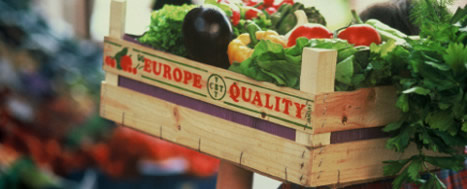The Future of Food and Farming – For a Flexible, Fair and Sustainable Common Agricultural Policy

Simpler rules and a more flexible approach will ensure the Common Agricultural Policy (CAP) delivers real results in supporting farmers and leads the sustainable development of EU agriculture. These are the cornerstone ideas of the Communication recently adopted to by the European Commission on ‘The Future of Food and Farming’, outlining the ways to ensure that the oldest EU common policy remains future-proof.
Allowing Member States greater responsibilities to choose how and where to invest their CAP funding in order to meet ambitious common goals on environment, climate change and sustainability is the flagship initiative.
Jyrki Katainen, Vice-President in charge of Jobs, Growth, Investment and Competitiveness, says: “The Common Agricultural Policy has been on our plate since 1962. While we have to make sure it keeps delivering for example healthy and tasty food for consumers and jobs and growth to rural areas, the CAP also has to evolve along with other policies. Our proposal is an important step to modernise and simplify the CAP, following the results of the broad consultation with stakeholders. The new delivery model introduced by the Commission will provide greater subsidiarity to Member States and calls them to establish CAP Strategic Plans, which will cover their actions under pillar I and pillar II, enabling simplification, better coherence and monitoring of results.”
Phil Hogan, Commissioner for Agriculture and Rural Development, says: “The Communication ensures that the Common Agricultural Policy will deliver on new and emerging objectives such as fostering a smart and resilient agricultural sector, bolstering environmental care and climate action and strengthening the social-economic fabric of rural areas. It also marks a significant step change in the implementation of the CAP. Instead of the current system, a new implementation system will be introduced, giving MS/regions a much greater degree of subsidiarity.”
 While keeping the current two pillar structure, the simpler, more flexible approach will set out the detailed actions to reach these objectives agreed at the EU level. Each EU country would then develop their own strategic plan – approved by the Commission – setting out how they intend to meet the objectives. Rather than on compliance, the attention will be paid more on monitoring progress and ensure funding is focused on concrete results. Moving from a one-size-fits-all to a tailor-made approach means the policy and its real-life implications will be closer to those who implement it on the ground.
While keeping the current two pillar structure, the simpler, more flexible approach will set out the detailed actions to reach these objectives agreed at the EU level. Each EU country would then develop their own strategic plan – approved by the Commission – setting out how they intend to meet the objectives. Rather than on compliance, the attention will be paid more on monitoring progress and ensure funding is focused on concrete results. Moving from a one-size-fits-all to a tailor-made approach means the policy and its real-life implications will be closer to those who implement it on the ground.
Support for farmers will continue through the system of direct payments. The Communication does neither pre-empt the outcome of the debate on the future of the EU finances, nor the content of its proposal for the next Multiannual Financial Framework (MFF). Without being exhaustive, it explores some possibilities to ensure a fair and better targeted support of farmers’ income.
Climate change and pressures on natural resources will continue affecting farming and food production. The future CAP should reflect higher ambition as regards resource efficiency, environmental care and climate action.
Other proposals include:
- Encouraging the use of modern technologies to support farmers on the ground and provide greater market transparency and certainty
- Greater attention to encourage young people to take up farming, to be coordinated with Member States’ own powers in such areas as land taxation, planning and skills development
- Address citizens’ concerns regarding sustainable agricultural production, including health, nutrition, food waste and animal welfare
- Seek coherent action among its policies in line with its global dimension, notably on trade, migration and sustainable development
- Creating an EU-level platform on risk management on how best to help farmers cope with the uncertainty of climate, market volatility and other risks
The relevant legislative proposals giving effect to the goals outlined in the Communication will be tabled by the Commission before the summer 2018, following the MFF proposal.
Background
On 2 February 2017, the European Commission launched a consultation on the future of the common agricultural policy (CAP) in order to better understand where the current policy could be simplified and modernised. During the three month consultation period, the European Commission received more than 320 000 replies, mostly from individuals. The consultation found that most respondents wanted to keep a strong common agricultural policy at European Union level but that it needed to be simpler and more flexible, and more focused on meeting the key challenges of ensuring a fair standard of living for farmers, preserving the environment and tackling climate change.

































